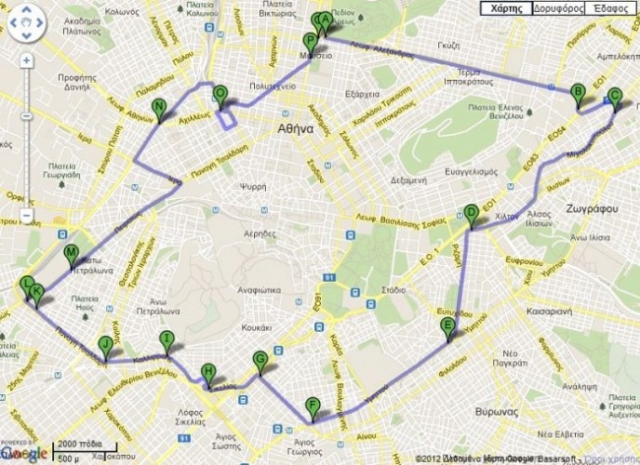Photo: Imerisia
The ban on cars entering the centre of Athens will come in force again from Monday, 3 September, onwards. For about two months, the centre of Athens was open to all vehicles without restriction. With the end of summer holidays, however, the citizens of the capital must again remember the rules of the rotation system for the entry of cars in the city. Under these rules, the cars with uneven registration numbers can freely enter the city centre only on uneven dates. The same applies to cars with odd registration numbers that can move along the main streets only on odd dates. The fine for drivers in violation will be up to 200 euro.
In addition to the known rules, the Ministry of Environment has decided that it will allow cars and trucks up to 2.2 tonnes in the city centre without restrictions if their engines meet the Euro5 standard or higher and emit less than 140g/km carbon dioxide. With this measure, the government gives priority to cars with lower emissions of greenhouse gases in the atmosphere. Hybrid cars can also enter the "green ring" of central Athens without restrictions and pay the lowest possible road tax. The restriction for other cars will be in force from Monday onwards and will apply for the area between the streets Alexandras, Zaharof, Mesogion, Fidipidos, Mihalakopoulou, Mercury, Vriaksidos, Imitos, Ilios, Fratzis, Sigru, Hamosterna, Piraeus, Ira Odos, Konstantinupoleos, Achilleos, Karaiskaki Square , Karolou, Marnis, 28 October (Patision) to Alexandras.
 In its efforts to collect as much money in the treasury as possible, the government proposed the imposition of a tax on immobilised vehicles. In the last three years, about 745 thousand vehicles were immobilised by their owners, who returned the registration plates to the tax services not to be subject to the new higher road taxes. In 2009, the number of registration plates returned was 170 thousand. In 2010, it was 210 thousand and last year, when taxes increased dramatically, 365 thousand registration plates were returned. Once the car is reported as "immobilised", the owners have the right to keep it, but not to use it and do not pay a tax on it.
In its efforts to collect as much money in the treasury as possible, the government proposed the imposition of a tax on immobilised vehicles. In the last three years, about 745 thousand vehicles were immobilised by their owners, who returned the registration plates to the tax services not to be subject to the new higher road taxes. In 2009, the number of registration plates returned was 170 thousand. In 2010, it was 210 thousand and last year, when taxes increased dramatically, 365 thousand registration plates were returned. Once the car is reported as "immobilised", the owners have the right to keep it, but not to use it and do not pay a tax on it.
Revenue from collecting road tax dropped after the outbreak of the crisis despite the increase in tax rates. The Ministry of Finance has found it a good idea to try to impose a tax on immobilised vehicles. The suggestions heard were that the owners of immobilised vehicles should pay 50% of the road tax due and the maximum amount should not exceed 100 euro.
The first to oppose the proposal were the members of New Democracy. "It is unacceptable, unfair and impossible to burden the poorest Greek households with additional and unwarranted financial burdens," Ioannis Mihelakis said yet in the middle of the week. He turned to Minister of Finance Yiannis Stournaras and Minister of Economy Kostas Hatzidakis with the request to not allow the imposition of the additional tax. It will burden the people in the most difficult social condition, who prefer to do without their vehicles, because they are unable to meet the required amounts. After pressure from public opinion, the Ministry of Finance made a statement that the there had been no ground for discussing the issue of imposing a tax on immobilised vehicles and it had never been on the agenda.